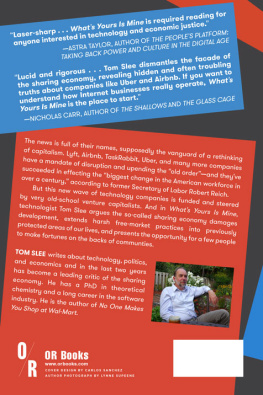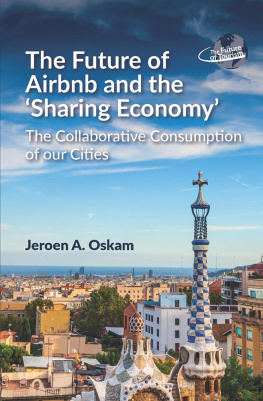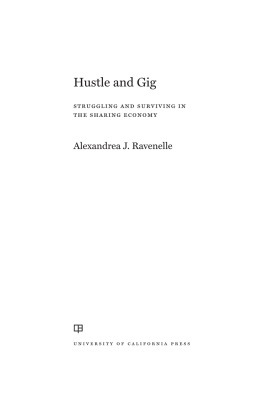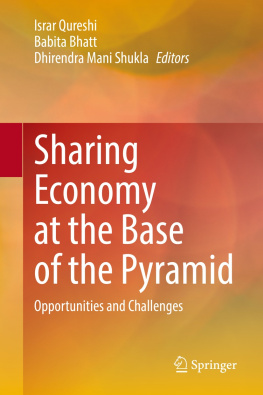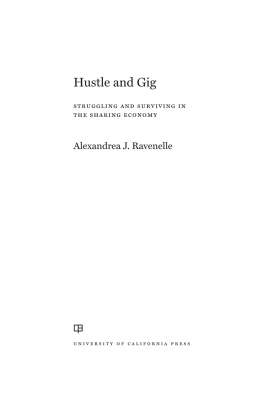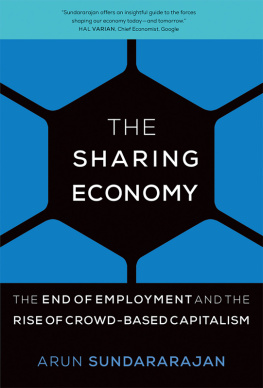
Whats Yours Is Mine
2015 Tom Slee
Published by OR Books, New York and London
Visit our website at www.orbooks.com
All rights information: rights@orbooks.com
All rights reserved. No part of this book may be reproduced or transmitted in any form or by any means, electronic or mechanical, including photocopy, recording, or any information storage retrieval system, without permission in writing from the publisher, except brief passages for review purposes.
First printing 2015
Cataloging-in-Publication data is available from the Library of Congress.
A catalog record for this book is available from the British Library.
ISBN 978-1-68219-022-7 paperback
ISBN 978-1-68219-023-4 e-book
Text design by Bathcat Ltd. Typeset by AarkMany Media, Chennai, India.
Amongst the highly placed
It is considered low to talk about food.
The fact is: they have
Already eaten.
BERTOLT BRECHT, From a German War Primer
Whats yours is mine,
whats mine is my own.
Traditional Yorkshire saying
To my mother, Audrey Slee
1. The Sharing Economy
T he Sharing Economy is a wave of new businesses that use the Internet to match customers with service providers for real-world exchanges such as short-term apartment rentals, car rides, or household tasks. At the leading edge of this wave are Uber and Airbnb, each showing eye-popping growth to bolster their claim that they are disrupting traditional transit and tourism industries. These two are followed by a flock of other companies vying to join them at the top of the Sharing Economy world.
Supporters sometimes describe the Sharing Economy as a new type of business and sometimes as a social movement. Its a familiar mix of commerce and cause in the digital world. Silicon Valley may have its share of the worlds richest people, but it has always seen itself and presented itself as being about more than money: its also about building a better future. The Internet is making the world better, not just by giving us better gadgets and more information, but by reshaping society, root and branch. We now have the technology to solve problems that have plagued humanity for centuries, making old institutions and old rules obsolete and replacing them with computation.
The buzz around the Sharing Economy began a few years ago, but it really started to enter the mainstream in 2013 and 2014. It makes promises that appeal to many people; they certainly appeal to me. Start with informal exchangesgiving a friend a car ride or borrowing a power drill, or running a few errands for neighborsand use the connecting power of the Internet to scale them up, so that we as individuals can rely more on each other and less on faceless, distant corporations. Each exchange helps someone make a little money and helps someone save a little time: whats not to like? By taking part in the Sharing Economy we help to build our community instead of being passive and materialist consumers; we help to create a new era of openness, in which we can find a welcome and a helping hand wherever we go.
The Sharing Economy promises to help previously powerless individuals take more control of their lives by becoming micro-entrepreneurs. We can be self-directed, dipping in and out of this new flexible mode of work, setting up our own businesses on Sharing Economy web sites; we can become an Airbnb host, a driver for Lyft, a handyperson for Handy, or an altruistic investor making loans on Lending Club. The movement seems to threaten those who are already powerful, like big hotel chains, fast food chains, and banks. Its an egalitarian vision built on peer-to-peer exchanges rather than hierarchical organizations, and its brought about by the Internets ability to bring people together: the Sharing Economy promises to get Americans [and others] to trust each other.
The Sharing Economy also promises to be a sustainable alternative to mainstream commerce, helping us to make better use of under-utilized resourceswhy does everyone need a power drill sitting on a basement shelf when we could share? We can buy less and so lighten our footprint on the planetmaybe use Uber rather than buy a car? We can choose access over ownership, and move away from a consumerism in which many of us feel trapped. We can be less materialistic, looking to experiences rather than possessions to give meaning to our lives.
Well, that was the promise.
Unfortunately, something different and altogether darker is happening: the Sharing Economy is extending a harsh and deregulated free market into previously protected areas of our lives. The leading companies are now corporate juggernauts themselves, and are taking a more and more intrusive role in the exchanges they support to make their money and to maintain their brand. As the Sharing Economy grows, it is reshaping cities without regard to those things that make them livable. Rather than bringing a new openness and personal trust to our interactions, it is bringing a new form of surveillance where service workers must live in fear of being snitched on, and while the company CEOs talk benevolently of their communities of users, the reality has a harder edge of centralized control. Sharing Economy marketplaces are generating new and ever-more-entitled forms of consumption. The language of a little extra money turns out to be the same as that used about womens jobs forty years ago, when they were not seen as real jobs that demanded a living wage, and so did not need to be treated the same, or paid as much, as mens jobs. Instead of freeing individuals to take control over their own lives, many Sharing Economy companies are making big money for their investors and executives, and making good jobs for their software engineers and marketers, by removing the protections and assurances won by decades of struggle, by creating riskier and more precarious forms of low-paid work for those who actually work in the Sharing Economy.

There is a contradiction built into the name sharing economy. We think of sharing as a non-commercial, person-to-person, social interaction. It suggests exchanges that do not involve money, or that are at least motivated by generosity, by a desire to give or to help. Economy suggests market transactionsthe self-interested exchange of money for goods or services. There has been a lot of debate about whether sharing economy is the right name to use to describe this new wave of businesses, and a raft of other names have been tried outcollaborative consumption, the mesh economy, peer-to-peer platforms, the gig economy, concierge services, or, increasingly, the on-demand economy.
There is no doubt that the word sharing has been stretched beyond reasonable limits as the sharing economy has grown and changed, but we still need a name when we talk about the phenomenon. While it may not last more than another year or so, sharing economy is the name used right now in 2015. I will use the name, but to avoid repeated use of the word alleged or annoyingly frequent scare quotes I will capitalize it as the Sharing Economy.
Definitions dont take us very far when talking about something as fluid and rapidly changing as the Sharing Economy, but we still need to draw some boundaries around the topic to talk about it coherently. Chapter surveys the Sharing Economy landscape: it explores what kind of organizations are included, where they come from, what they do, and how they are funded. The chapter shows that there are at least two visions of the Sharing Economy: the first is the communitarian and co-operative vision focused on small-scale personal exchanges. The second is the disruptive, globe-straddling ambition of companies with billions of dollars to spend challenging democratically made laws around the world, acquiring competitors in search of scale, and (in Ubers case) researching new technologies to render its work force obsolete. If the former vision can be called whats mine is yours, I think of the latter as whats yours is mine.

